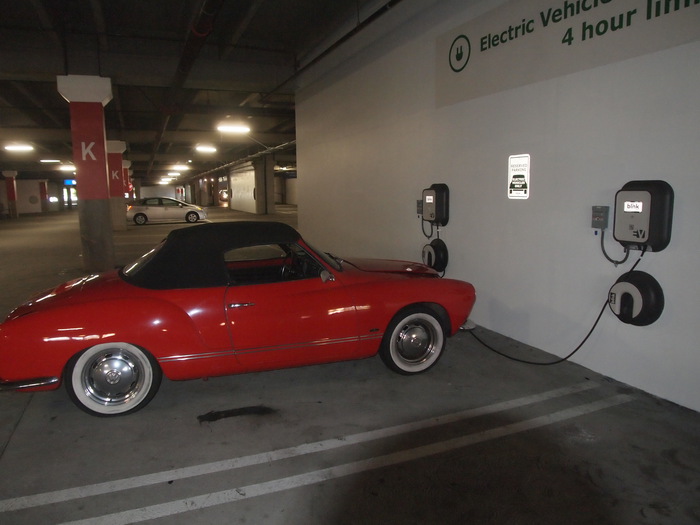The change two weeks ago by Blink Networks to switch from per-hour pricing to per-kilowatt-hour pricing has caused an eruption of anger among Blink members. The change was supposed to solve another big problem – Blink’s habit of rounding up session fees to the next hour even when the elapsed time is only 1 minute beyond the hour. That is, a 1 hour 1 minute session under the old rules would cost $2 rather than $1 and a few cents. But under the per-kilowatt-hour pricing rules, that session would cost nearly $3 (depending on locale).
What’s going on? Is the CarCharging Group crazy? Maybe they are, because of the actual reasons for these price differences, or maybe CarCharging Group (the owner of the Blink Network) has simply switched to a fee structure that makes actual business sense.
Under the old model Blink members paid $1 per hour. Since the typical electric car consumes 6 kilowatt-hours during that time, that $1 equates to about $0.16 per kilowatt-hour. Well, except for the 1 hour 1 minute charging sessions costing $2, equating to $0.32 per kilowatt-hour.
Under per-kilowatt-hour pricing CarCharging Group (a.k.a. Blink) is charging between $0.39 to $0.79 per kilowatt hour. The cost per hour (at 6 kilowatts charging rate) equates to between $2.34 and $4.74. Per hour.
Yikes, that’s a big jump – from $1 per hour to nearly $5 per hour depending on local electricity rates.
CarCharging isn’t alone in charging a steep per-kilowatt-hour rate. SemaCharge and many ChargePoint stations cost $0.49 per kilowatt-hour, equating to $2.94 per hour at a 6 kilowatt charging rate.
In states where Blink cannot charge per-kilowatt-hour, they changed the pricing to $0.04 to $0.06 per minute, measured by the minute. That’s a sigh of relief for those who’ve been charged $2 for a 1 hour 1 minute session, but calculate the new per hour price and … well … that equates out to $2.40 to $3.60 per hour. FWIW, That’s roughly in the ballpark of the per-kilowatt-hour pricing.
A little nitpick – in practice most of the public charging stations run at less than a 6 kW charging rate. Typical stations show voltages between 195 volts to 208 volts, resulting in a 5.8-5.9 killowatt charging rate. That’s close enough to 6 kilowatts for our purposes, but the numbers I’m giving here aren’t 100% accurate.
In any case, my theory is that a $1 per hour fee ($0.16 per kilowatt-hour) is not a sustainable business.
Consider… What’s the business cost for operating a charging station network? It’s clearly more than the cost of electricity – for which the nationwide average is $0.11 per kilowatt-hour. Revenue of $0.16 per kilowatt-hour leaves only $0.05 per kilowatt-hour from which to pay for other costs, and derive a profit. The other costs have to include network operations, amortizing the charging station capital cost, maintenance of the charging station, corporate staff salaries, fees to host sites, and perhaps more that I can’t think of.
Is charging $0.16 per kilowatt-hour (uh, $1 per hour) a sustainable business? We don’t know because we can’t look at the books of these corporations. But, that they’re all charging in the neighborhood of $0.49 per kilowatt-hour, or in the range of $2.40-$4.70 per hour, suggests $1 per hour ($0.16 per kilowatt-hour) really is not sustainable.
We do want these charging networks to survive – because we need their service. At the same time we don’t want them to gouge us.
P.S. Before someone suggests that $0.49 per kilowatt-hour is gouging when electricity costs $0.11 per kilowatt hour, think about the costs I listed. How will those costs be paid?
We want the charging networks to survive, and therefore the fees have to be high enough that the business makes its profit.
- Highway design could decrease death and injury risk, if “we” chose smarter designs - March 28, 2015
- GM really did trademark “range anxiety”, only later to abandon that mark - March 25, 2015
- US Government releases new regulations on hydraulic fracturing, that some call “toothless” - March 20, 2015
- Tesla Motors magic pill to solve range anxiety doesn’t quite instill range confidence - March 19, 2015
- Update on Galena IL oil train – 21 cars involved, which were the supposedly safer CP1232 design - March 7, 2015
- Another oil bomb train – why are they shipping crude oil by train? – Symptoms of fossil fuel addiction - March 6, 2015
- Chevron relinquishes fracking in Romania, as part of broader pull-out from Eastern European fracking operations - February 22, 2015
- Answer anti- electric car articles with truth and pride – truth outshines all distortions - February 19, 2015
- Apple taking big risk on developing a car? Please, Apple, don’t go there! - February 16, 2015
- Toyota, Nissan, Honda working on Japanese fuel cell infrastructure for Japanese government - February 12, 2015
















